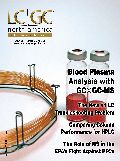Northeastern University Researcher Receives International Honors
Northeastern University Researcher Receives International Honors
Northeastern University Researcher Receives International Honors
Dr. Barry L. Karger, the James L. Waters Chair in Analytical Chemistry, Director of the Barnett Institute of Chemical and Biological Analysis at Northeastern University, and internationally recognized expert on separation science, has been elected into the Hungarian Academy of Sciences as an honorary member. Dr. Karger has also been awarded the Csaba Horváth Medal of Innsbuck, Austria, for his contributions to the field of separation science and bioanalytical chemistry.
Membership in the Hungarian Academy of Sciences generally is restricted to Hungarian citizens and scholars. Scientists active in a foreign country can be elected for honorary membership if they pursue their field of science on an internationally recognized level and if their achievements are worthy of the the special esteem of the Hungarian scientific community.
Now the eighth year, the Csaba Horváth Medal is given to a recognized person in the field of separation science whose contributions to the field have exemplified the advancement of separation science for the future. The award is named after Csaba Horváth, who was a Hungarian-American chemical engineer noted for building the first high-performance liquid chromatograph.
"I am deeply honored by both recognitions. Hungary is historically strong in this scientific field and it is a particular honor to be chosen by fellow scientists in the international scientific community," said Kargar.
On receiving the Csaba Horváth award he said, "Csaba was one of the greatest pioneers in the field of separation science, a personal friend, and a great colleague. Receiving this award is both a personal and a professional honor for me."

New Study Reviews Chromatography Methods for Flavonoid Analysis
April 21st 2025Flavonoids are widely used metabolites that carry out various functions in different industries, such as food and cosmetics. Detecting, separating, and quantifying them in fruit species can be a complicated process.
University of Rouen-Normandy Scientists Explore Eco-Friendly Sampling Approach for GC-HRMS
April 17th 2025Root exudates—substances secreted by living plant roots—are challenging to sample, as they are typically extracted using artificial devices and can vary widely in both quantity and composition across plant species.
Sorbonne Researchers Develop Miniaturized GC Detector for VOC Analysis
April 16th 2025A team of scientists from the Paris university developed and optimized MAVERIC, a miniaturized and autonomous gas chromatography (GC) system coupled to a nano-gravimetric detector (NGD) based on a NEMS (nano-electromechanical-system) resonator.

.png&w=3840&q=75)

.png&w=3840&q=75)



.png&w=3840&q=75)



.png&w=3840&q=75)











